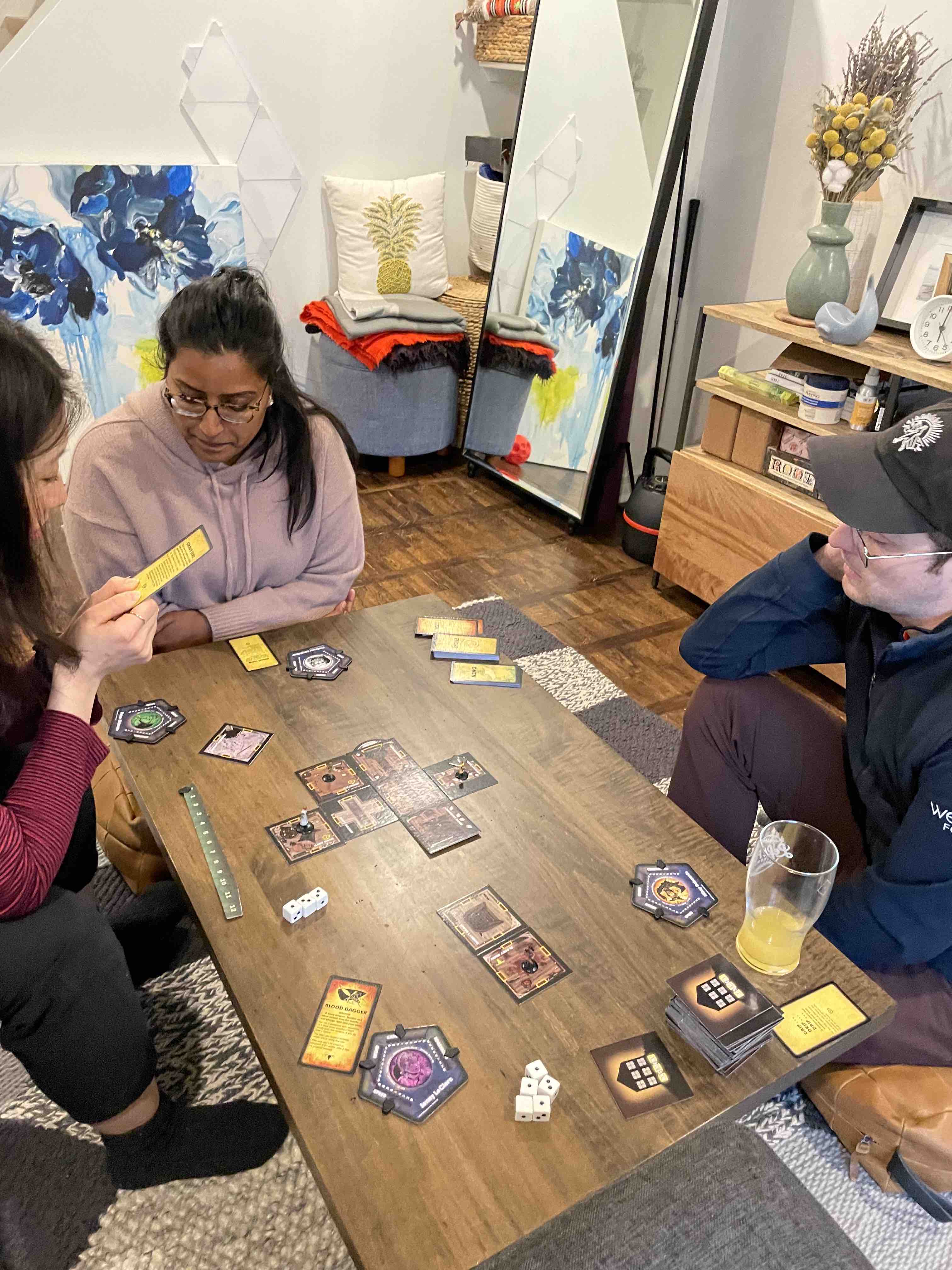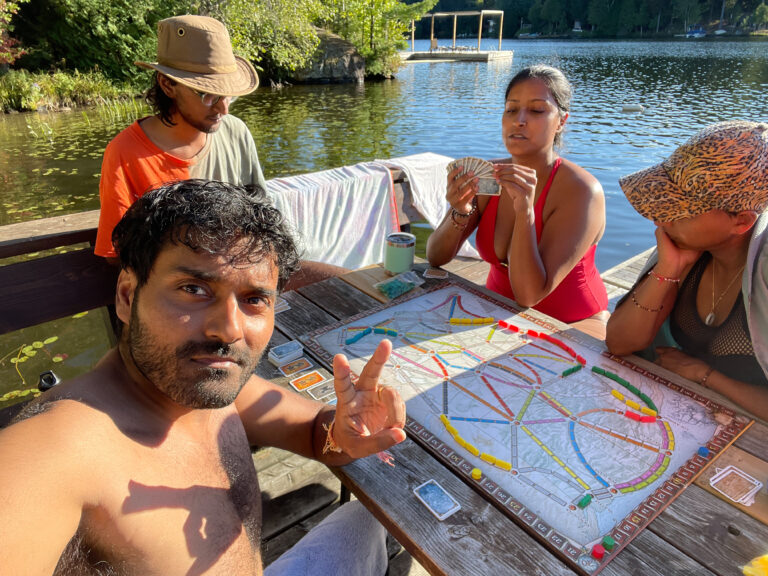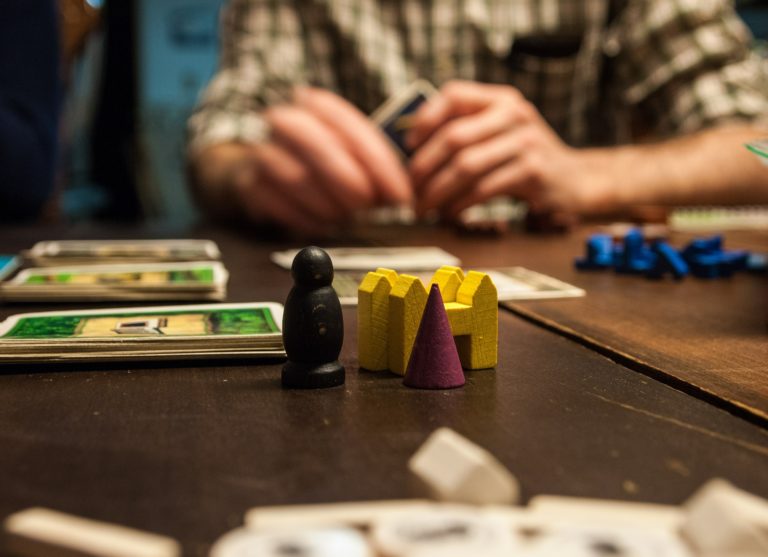A perfect outlet for my wife and my endless quest to best one another are two-player board games!
Over the past several years, we’ve purchased over 50 board games collectively and tried countless more. Some board games are definitely more enjoyable than others.
These are the best two-player board games that we seem to never stop playing!
Article Contents:
- Carcassonne · 25 – 45 minutes · 2 to 5 players
- Patchwork · 25 – 35 minutes · 2 player
- 7 Wonders Duel · 35 – 45 minutes · 2 player
- Monopoly Deal · 15 – 20 minutes · 2 to 5 player
- Splendor · 25 – 45 minutes · 2 to 4 player
Honorable Mentions: Citadels & Ticket to Ride
Gameplay: 25 to 45 minutes
Players: 2 to 5
Transportability: Medium
Difficulty to Learn: Medium
Setup Time: 2 minutes
Expansions: Yes
Price: $35 – $45
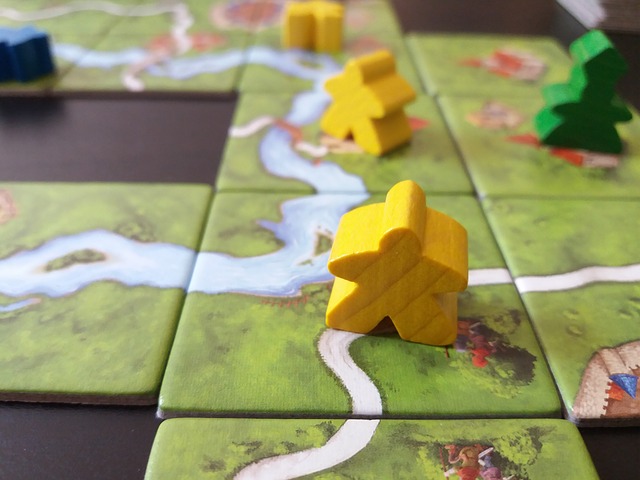
When you’re itching to play a two-player board game that’s both competitive and quick, Carcassonne is the game to play.
Setup consists of taking out the scoring board, choosing a color of “followers” and mixing up the game tiles face-down in the box. That’s it!
Quick Rules
A starter tile is placed face-up in the center of the playing table. Players then take turns choosing tiles randomly and placing them face up on the table, connecting new tiles to the existing tile(s). Tiles must fit together such that the “border” of the tiles work together.
A new tile, when connected to an existing tile, completes the map without producing a fallacy, such as a road ending abruptly, a field-edged tile connected to a city-edge tile, etc.
After placing a tile, the player can take one follower from his/her supply and place it on the tile that he/she just placed. The follower can be placed in a city (knight), on a road (thief), on a monastery (monk) or on a section of field (farmer).
By completing a road, city or monastery, points are awarded immediately and followers on the scored/completed structures are then placed back into the player’s supply. Farmers are scored at the end of the game, along with followers on unfinished structures.
The game ends when there are no more tiles to play and the player with the most points wins!
Why it’s Great
The randomness of the tiles, the additional challenges and opportunities presented from the expansions, and the ability to wreak havoc on your opponent’s gameplay are essential to why Carcassonne is a workplace favourite.
Looking for the complete rules to play Carcassonne? Check them out here.
Gameplay: 25 to 35 minutes
Players: 2
Transportability: Medium
Difficulty to Learn: Low
Setup Time: 4 minutes
Expansions: No
Price: $30 – $35
A fair warning: If you or your partner have OCD you will either fall in love or come to hate this game.
Case in point, my wife, who obsesses over puzzles, is on a personal quest to beat her high score of 37!
[For your information, first timers usually do well if they score a non-negative number…]
Quick Rules
The name of the game is to complete the highest-scoring “quilt” on your personal 9 x 9 game board by purchasing and placing “patches” (essentially jigsaw pieces) onto your quilt.
Each player starts with 5 “buttons” (equivalent to 5 points). A starter marker signifies the beginning of the patches, arranged in a circle around the time tracking board.
On a turn, a player can pass or purchase one of the three patches available clockwise from the starter marker. You pay the cost in buttons shown on the patch, move the starter marker to the position of the patch, add the patch to your game board and advance your player token on the time tracking board the number of spaces indicated on the patch.
If your player token is behind or on top of your opponent’s token you take another turn. If you pass on your turn, move your player token to one space in front of your opponents, and take one button for every space you moved.
During the game, if you pass a button icon on the time tracking board, you collect button income equivalent to the number of buttons from the patches on your personal board.
Once you reach the center of the time tracking board, count the number of buttons you have and subtract two buttons for every space on your quilt that is empty.
The player with the most points (which can be a negative number!) wins.
Why it’s Great
Although strictly a two-player board game, Patchwork is an endless quest to best your own previous score.
It’s challenging enough that you want to play games back-to-back, but not to the point where you overlook it.
Check out this obscure board game that’ll have you battling for buttons.
Looking for the complete rules to play Patchwork? Check them out here.
Gameplay: 35 to 45 minutes
Players: 2
Transportability: Low
Difficulty to Learn: Medium
Setup Time: 10 minutes
Expansions: No
Price: $40 – $45
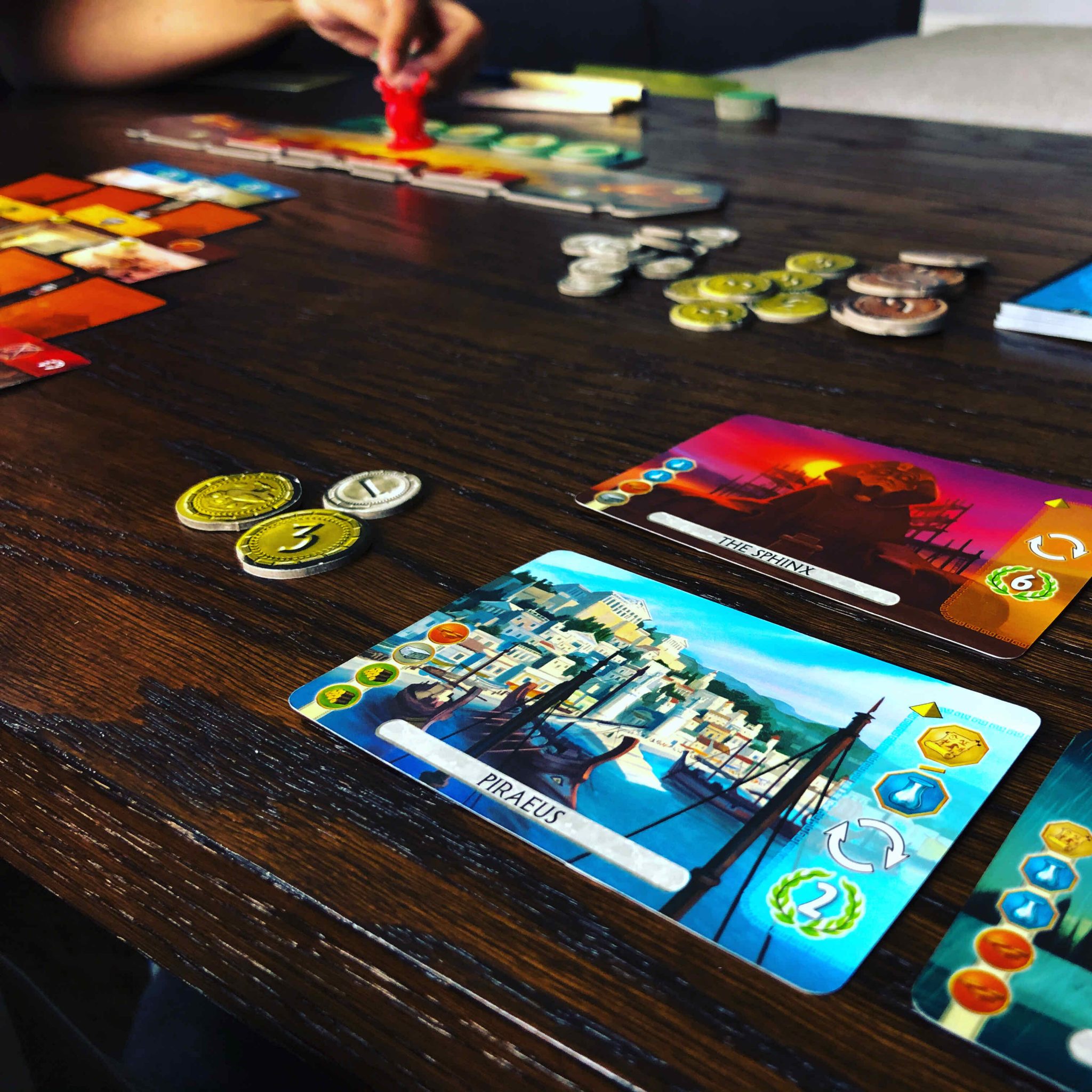
A fantastic, multi-faceted two-player board game, 7 Wonders Duel feels a lot like a real-time strategy game (i.e. Age of Empires). No internet connection required!
Quick Rules
The ultimate head-to-head game of conquest, 7 Wonders Duel pits players to collect resources, advance their military and/or scientific development, and establish a civilization complete with wonders.
There are three ages (or rounds) of cards that are set up. Cards are set up in a specific pattern, face up and face down during each round. Players take turns selecting available cards to be either added to their stack, discarded for coins, or used towards constructing a wonder.
Building a wonder results in some sort of bonus. Resource cards such as water, wood, brick, stone and paper are required to build wonders. Coins can also be used to purchase resources in-lieu of resource cards.
Military conquest, scientific achievement and victory points cards are also available to be selected. Players can win by military conquest (selecting military cards and advancing to your opponents capital), scientific supremacy (collecting 7 different scientific development cards) or, if neither occurs, by total victory points at the end of the game.
Why it’s Great
Battling over resources and building wonders, while also not being defeated militarily or scientifically – each match can be an emotional rollercoaster!
7 Wonders Duel can feel like a grudge match. This strictly two-player board game is a solid choice for competitive-minded players.
Looking for the complete rules to play 7 Wonders Duel? Check them out here.
Gameplay: 15 to 20 minutes
Players: 2 to 5
Transportability: High
Difficulty to Learn: Low
Setup Time: 1 minutes
Expansions: No
Price: $5 – $10
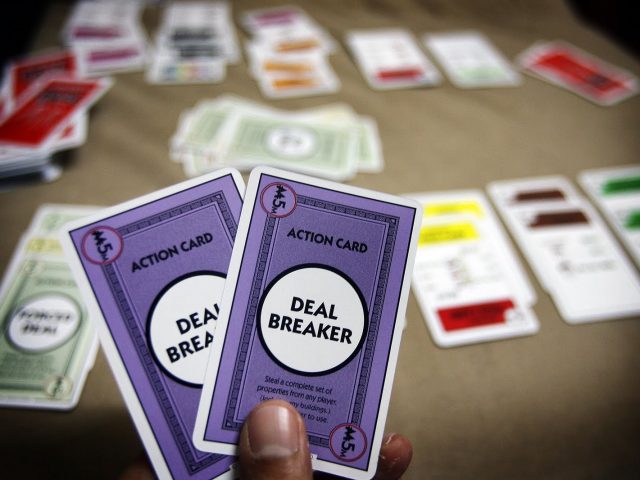
Monopoly deal is a card game that is just as competitive as its older brother but at a fraction of the time (and cost!).
It’s loads of fun for adults and kids with virtually zero setup and takedown time.
Quick Rules
The goal of the game is to collect 3 complete sets of properties of different colours. Each player starts with 5 cards. On your turn, you draw two cards and play up to three cards.
Cards can be played as either properties, enhancements to your properties (houses or hotels), actions (collect rent, birthday money or steal/swap property cards) or add as money to your bank account. It’s just that simple.
It’s so easy, kids as young as 8 can learn to play. And unlike regular Monopoly, Monopoly Deal actually ends fast enough that you can play over and over again.
Why it’s Great
We always bring Monopoly deal with us when we travel.
So, whether it’s playing on an airplane, couch, or kitchen table, Monopoly Deal is a great choice for kids and adults alike. And it’s our go-to gift for kids!
Looking for the complete rules to play Monopoly Deal? Check them out here.
Gameplay: 25 to 45 minutes
Players: 2 to 4
Transportability: Medium
Difficulty to Learn: Medium
Setup Time: 10 minutes
Expansions: Yes
Price: $35 – $40
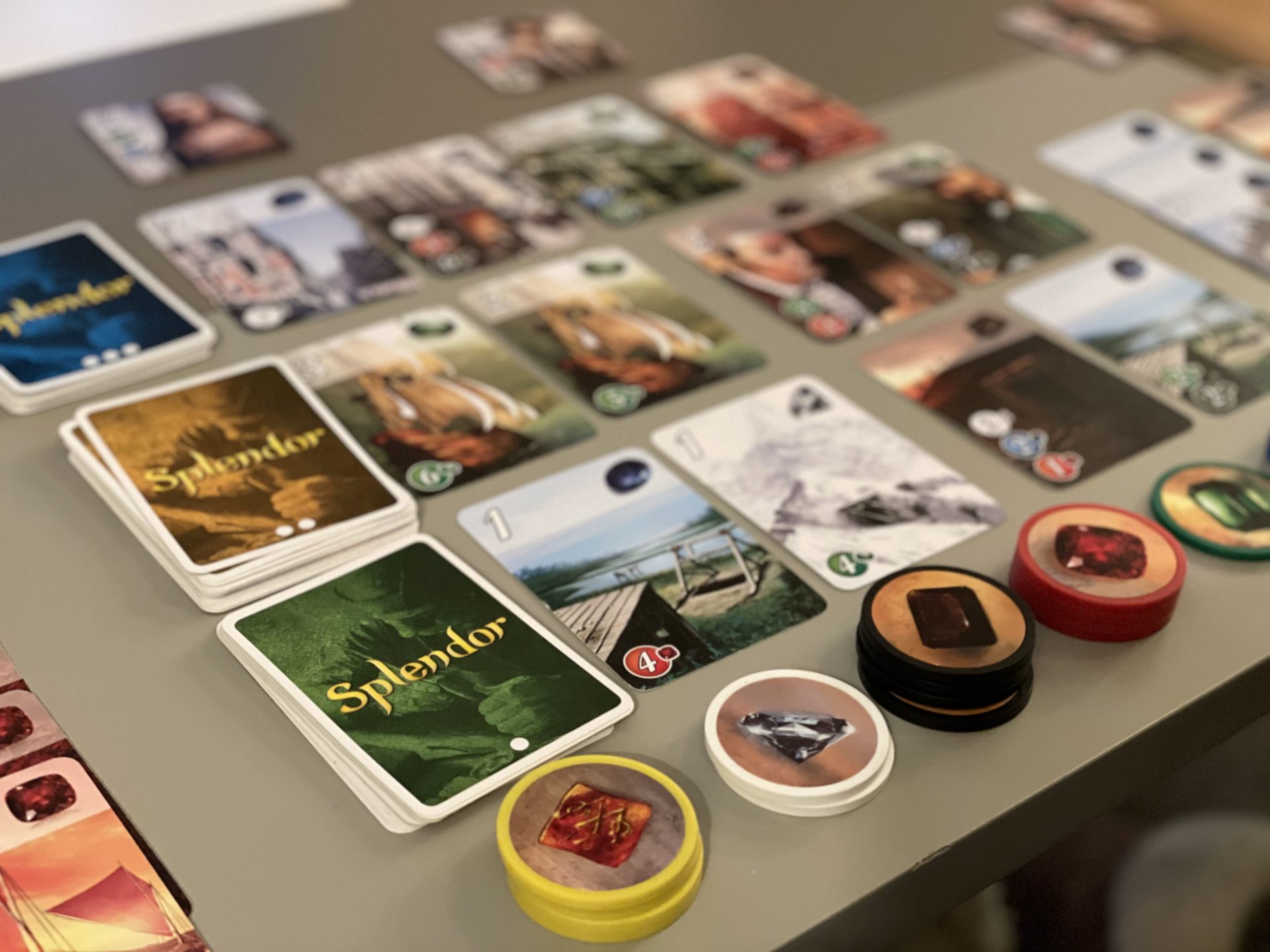
Splendor is a board game that tests your patience and persistence.
It’s a game that builds with anticipation until suddenly (or not so suddenly) the max score is reached and, if you’re like me, you’re left pondering how you didn’t see it coming.
Quick Rules
The first player to reach or exceed 15 prestige points wins. To get prestige points, you need to purchase prestige gem cards. To purchase prestige gem cards, you need to have either enough tokens (chips) and/or gem cards.
And to get gem cards, you need to purchase them with tokens. Finally, to get tokens, you can pick them up 3 (or two) at a time on your turn. Phew! That’s the game in a nutshell.
There are 5 standard colours of tokens to choose from, the total of each colour token depends on the number of players. There are also 3 tiers of gem cards (green, yellow and blue), each progressively more expensive to purchase, but each more rewarding than the previous tier.
On your turn, you have three options:
- You can (1) pick up two of the same tokens (if all tokens of that colour are available) or three tokens (each of a different colour) and add them to your stack from the bank.
- (2) Purchase a gem card with the corresponding number of tokens/gem cards, and add the purchased card to your stack.
- Or (3) reserve a card for yourself for purchase at a later time, collecting a gold token in the process, which counts as an universal colour token.
Why it’s Great
Splendor starts out at a slow pace, but quickly becomes a battle for prestige point supremacy! Throughout the game you are constantly anticipating your opponents next move while planning your own.
It’s an intense board game that feels like a chess match at times. The expansions also offer alternative ways of playing. It’s a battle royale, without the bloodshed!
Looking for the complete rules to play Splendor? Check them out here.
Gameplay: 20 to 60 minutes
Players: 2 to 8
Transportability: High
Difficulty to Learn: Low
Setup Time: 4 minutes
Expansions: Yes
Price: $20 – $25
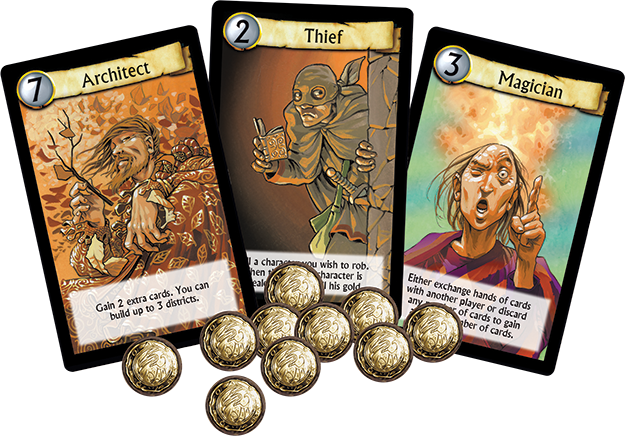
Gameplay: 25 to 60 minutes
Players: 2 to 5
Transportability: Low
Difficulty to Learn: Medium
Setup Time: 10 minutes
Expansions: No
Price: $55 – $65
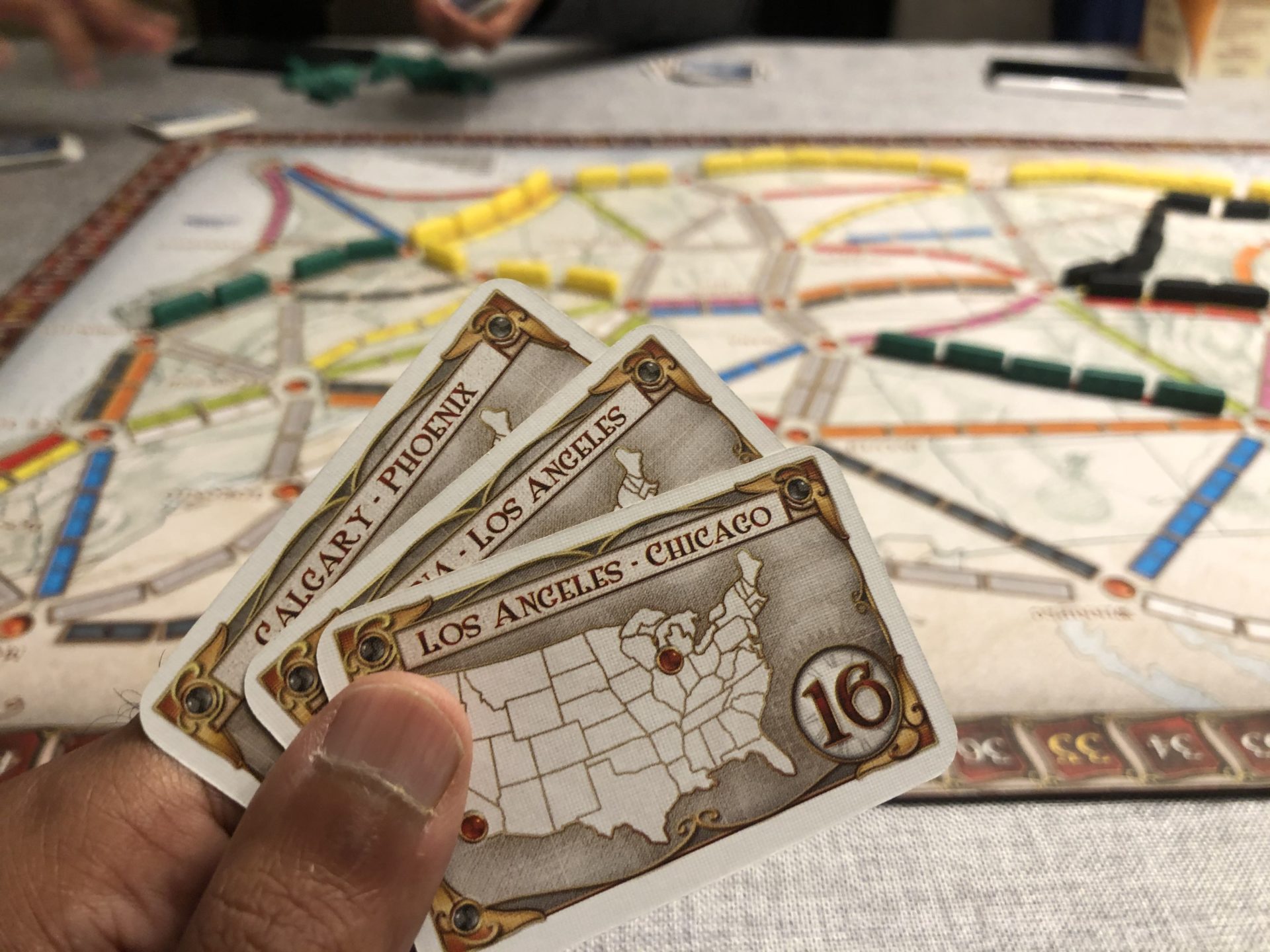
Citadels and Ticket to Ride are fun two-player board games with great replay-ability. Both have simple rules and similar gameplay times.
Citadels is very portable, like Monopoly Deal, making it an ideal travel companion. The board for ticket to ride is fairly big, so a large, flat surface is required to play.
Although we’ve enjoyed playing both, Citadels and Ticket to Ride are even more fun with more people playing. The games tend to last a bit longer with more people and the gameplay is more dynamic and less predictable.
Both are really good board games for the office, or perfect to play at school, over lunch with coworkers or classmates.
These are a few of our favourite two-player board games. I’ll be updating this list as our board game collection grows, and we hope yours does too…
What are your favourite two-player board games? Let me know in the comments!
This article contains affiliate links, which help support this blog at no cost to you!

